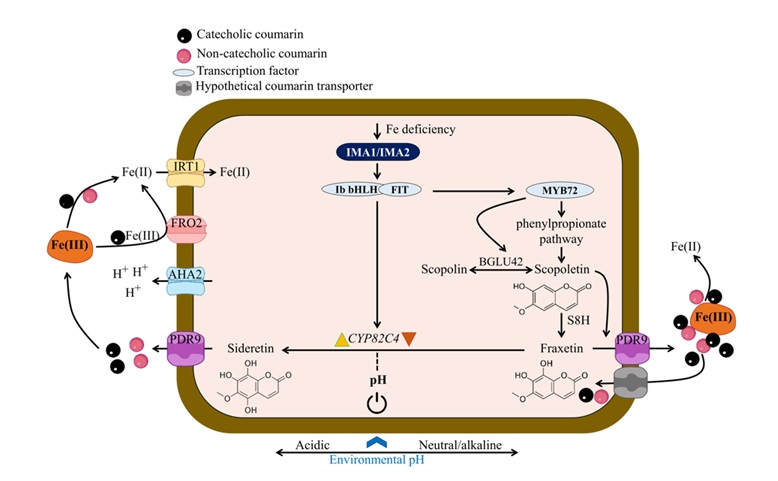[Wolfgang Schmidt] IRONMAN, a real-life action hero
POST:Iron (Fe) is an essential mineral element which governs the composition of natural plant communities and limits crop yield in agricultural ecosystems due to its extremely low availability in most soils, particularly at alkaline pH. To extract sufficient Fe from the soil under such conditions, some plants including Arabidopsis thaliana secrete Fe-mobilizing phenylpropanoids, which mobilize sparingly soluble Fe hydroxides by reduction and chelation. Research from Wolfgang Schmidt’s lab showed that ectopic expression of the IRONMAN peptides IMA1 and IMA2 improves growth on calcareous soil by inducing the biosynthesis and secretion of the catecholic coumarin fraxetin (7,8-dihydroxy-6-methoxycoumarin) through increased expression of MYB72 and SCOPOLETIN 8-HYDROXYLASE (S8H), a response which is strictly dependent on elevated environmental pH (pHe) (Gautam et al., 2021). By contrast, transcription of the cytochrome P450 family protein CYP82C4, catalyzing the subsequent hydroxylation of fraxetin to sideretin, which forms less stable complexes with iron, was strongly repressed under such conditions. It is concluded that IMA peptides regulate processes supporting Fe uptake at both acidic and elevated pH by controlling gene expression upstream of or in concert with a putative pHe signal to adapt the plant to the prevailing edaphic conditions. This regulatory pattern confers tolerance to calcareous soils by extending the pH range in which Fe can be efficiently absorbed from the soil. Altering the expression of IMA peptides provides a novel route for generating plants adapted to calcareous soils.
